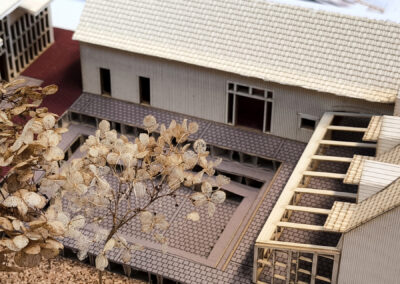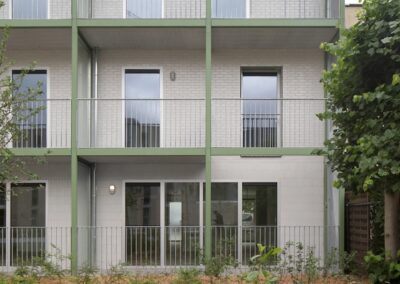HABITER2030, a future-facing vision of architecture.
Can you introduce yourself and explain your role in the world or architecture?
D. D. Of course! I’m Delphine Droussent, an urban planner for the government and architecture consultant at the DRAC Hauts-de-France (Direction Régionale des Affaires Culturelles). My professional path took me notably from working as a freelance architect to an architect for French buildings. Since 2021, as part of the regional service for architecture and architectural heritage, I’ve been collaborating with HABITER2030, an association which captured my attention through its commitments and its inspiring projects.
How did you discover HABITER2030 and what was your first impression?
D. D. I discovered HABITER2030 by following one of their existing partners. It’s a dynamic association, which stands out for its autonomy and energy. Pascale Sannier and Béatrice Auxent, my main contacts, were looking to capitalise on their victory at the Solar Décathlon Europe that H2030 won in 2019. That’s how we came to financially support this educational and research initiative, a fascinating project. I really appreciate their professionalism, their human qualities and their exciting ideas, which are always useful!
What motivated you to collaborate with HABITER2030?
D. D. What touches me in particular is their multidisciplinary and educational approach. The association follows initiatives like the New European Bauhaus, it participates in European projects, and it actively works with multiple actors like providers of social housing, all while paying special attention to the awareness of the general public. It’s very valuable to be able to speak to such different audiences while staying clear, accessible and relevant. At a time when exterior thermic insulation sometimes alters the urban landscape and where the challenges of energy renovation are more decisive than ever, HABITER2030 defends the idea of thoughtful, respectful architecture. The capacity to simultaneously mobilise students, entrepreneurs and organisations is simply admirable.
Can you talk about the Méta Plateau Projet which mobilises students, their teachers and other actors and partners every year?
D. D. Absolutely. Even if I am following along from afar, I see each year that it’s a major collaborative project that emphasises thermic renovation and multidisciplinarity. It allows for shared perspective of residents, engineering and architecture students, and professionals. What I appreciate in particular is the new perspective that the participating students offer. They approach challenges with a creativity and audacity that can really change mindsets, notably among providers of social housing and entrepreneurs. This educational approach is a real strength when it comes to preserving our architectural heritage.
What benefits do you get from your partnership with HABITER2030?
D. D. HABITER2030 is an association which brings together ambition and humility. It carries out broad actions, while remaining anchored in reality. Their seriousness, their mobilisation and their administrative rigour are exemplary. Thanks to HABITER2030, architecture is gaining visibility among a wider public, from providers of social housing to citizens.
What do you currently expect from this collaboration?
D. D. I will work with HABITER2030 on regional strategy for architecture. Today, I am convinced that the association has an essential contribution to make. I would love to speak with Pascale and Béatrice soon. Being based in Amiens, it’s difficult for me to attend all their events so I hope that their future projects move closer to my HQ (laughs). But I remain enthusiastic in regards to the future impact of their efforts, which, I’m convinced, will continue to plant the seeds to enliven our [architectural] vocations and preserve our heritage. I believe deeply in the idea of making architecture accessible to all. Teaching the discipline from high school, where the awareness of the decision makers of tomorrow could prevent mistakes in the way we build and transform our landscapes. With projects like those of HABITER2030, we are heading in the right direction: bringing awareness, mobilising, and inspiring. This is how we can build a future where architecture occupies a central place in our society.





